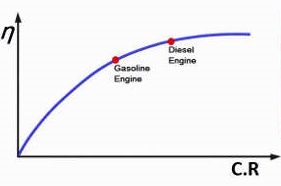Originally published at: https://www.pakwheels.com/blog/petrol-vs-diesel-engines/
We have continuously heard debates over whether petrol or diesel engines are better but do we really know what their differences are? Let’s find out!
Working of a Petrol Engine:
In a petrol engine, when a piston goes down, it pulls in some air with it. Simultaneously, some fuel is also injected into the cylinder and creates an air-fuel mixture. In the next stroke when the piston goes up, it compresses the air-fuel mixture increasing its temperature with it. But the temperature is not hot enough to ignite the mixture because the flash point of petrol is low. Flashpoint is the minimum temperature required for a liquid fuel to form a spontaneously combustible mixture. Hence a spark plug is used to create a spark which ignites the air-fuel mixture just before it reaches the top of the cylinder. The piston then goes down in the next stroke due to increase in the volume of the gas formed inside the cylinder; this is the power stroke. The very next stroke is the exhaust stroke which then pushes out these burnt gases from the cylinder.
Working of a Diesel Engine:
In a diesel engine, the start is basically the same; the piston goes down and pulls in air with it, but the fuel is not injected at this stage. When the piston moves back up, it compresses the air with it to very high temperatures. Just before the piston reaches the top, a fine spray of diesel fuel is injected into the cylinder and mixed with highly compressed super-heated air. As the flash point of diesel is really high, it immediately starts to burn and produces enormous amounts of gas (the power stroke) which is then ejected back into the atmosphere by the exhaust stroke. Hence no spark plug is needed in a diesel engine which is the basic difference between the two engines.
Now that we know the differences between the two, let us examine their differences.
Differences between Petrol and Diesel Engines:
Which of the two is economically better?
As the diesel engine is compressing only air, it can achieve a high compression ratio without the danger of self-ignition whereas, in a petrol engine, the mixture cannot be raised to a high compression ratio since it is at the risk of self-ignition; known as knocking which badly damages the engine. Hence because of these high compression ratios, a diesel engine can give more mileage as compared to a petrol engine. Hence it is economically better.
What happens if you put wrong fuel in the wrong engine?
Putting diesel in a petrol engine will not even combust because of the fact that diesel is less volatile hence it will not form a good mixture. Such a poor quality mixture cannot be ignited by a spark plug.
On the other hand, using petrol in diesel engines will cause detonations and wearing of parts because it is a highly volatile fuel which is poured into highly compressed air. These detonations damage the engine parts. Also since petrol does not have lubrication properties, it tends to wear out intricate engine parts.
Lets us know what you think, and which one do your prefer in the comments section below.